Arizona Pines
Generational renaissance and generosity
Here’s the podcast version of the story. And here’s the song. Enjoy!
“If you ever find yourself out this way in a car, I’ll load you up with more instruments and gear.” That’s what my Uncle BJ said to me when I sent him a photo of myself on stage at the Blue Note, rocking the gold-top Les Paul he’d sent me a few years before.
Thing is, the man lives all the way out in Arizona. And I live smack in the middle of the country. “When am I ever going to be in Arizona in a car?” I thought.
Turns out? This past summer. I was set to drive solo to an ultimate frisbee tournament in Colorado. “How much further could Arizona be?” I thought.
Turns out? About 13 more hours. Shoot, I can drive that standing on my head.
And so it came to pass that I embarked on a solo road trip from Missouri to Arizona and back. It was about 44 total hours of driving. Along the way, I spent time in Colorado; then Moab, Utah on a whim; then Prescott, Arizona (north of Phoenix); then Colorado again; and finally, home.
But this isn’t the story of my road trip out West. It’s the story of generational renaissance and generosity.
I came home with a ridiculous amount of musical instruments and gear. More than he’d originally promised. More than I expected. More than made sense. Zounds!
First, I’m going to tell you about Uncle BJ and his fascinating life.
The man who refused to sweat
Everyone in my family (both sides) is from Ohio. My mother is the eldest of four siblings; BJ is the second oldest, then Bill, then Brian.
Ohio is a good place to be from. Lots of us leave.
And indeed, after college, BJ left the Midwest and headed to Arizona, pursuing a master’s degree (and a girl, sort of). He went to work in retail, rose to a management position in that company, and eventually left to start his own insurance agency. And then retired early.
One of the funniest things to me about BJ is that although he’s been out West for decades, he’s spent a lot of time avoiding the hottest parts of the area. For example, he lived on a sailboat for a number of years. A sailboat! In Arizona!
And more recently, he and his wife Karla moved up into the Arizona pines, where the weather is cool and perfect in those blazin’ hot summer months. When the winter sets in, back down into the valley they go.
…did you know there was pine forest in Arizona? I certainly did not.
Those hills (in and around Prescott, AZ) are around 6,000 feet high. And this place up in the hills, lemme tell you, it’s pretty remote. Time was, a mining company owned the land, right in the middle of a national forest. When the mining shut down, there were a bunch of mining cabins dotting the landscape, and people snapped them up. BJ and Karla bought one and have been fixing it up, and living there for part of the year, ever since.
Hanging out at the mountain
I didn’t quite realize just how far out there it was until I was nearing Prescott (rhymes with “biscuit”). BJ had told me to let him know when I was getting close, so I gave him a call.
The instructions were only slightly ominous. They involved telling me where to turn on this certain road, and the timing of this turn was important, because I would lose cell service a few miles down it.
And then I would have to wend through the mountain road and locate another road that wasn’t really a road at all, and had no road sign, but it's called “Pink Car Road” because there's…a pink car at the turn.
He said he would meet me there, and he did. He was perched atop a Gator. “Follow me,” he said. “Make sure you keep it at about 10mph, or you won't make it up the hill.” Ope.
That’s because Pink Car Road can be only loosely defined as a road. It's a steep, twisting dirt path through the pines, wide enough for about 1.3 cars.
I followed the directions, and my minivan and I made the ascent to their cabin without sliding back down the mountain. A win, I felt.
The cabin is, like every project any of my mother’s three brothers tackle, a work in progress. (I inherited this penchant, too.) BJ and Karla had built a big loft on top of the original cabin, making a second bedroom. The back deck is enormous, and full of furniture, plants, and treasures, and it offers a rich view of the pine forest.
There are few structures up there on the mountain. Other than the smattering of other old mining cabins, and some large and high-end modern cabins, there’s nothing else but a volunteer fire station out on the main road.
There is also a “church.” Like the “road,” the church defies standard definition. It's an outdoor church. No walls or ceiling. Just the towering pines for cover on a Sunday morning.
We had a fun couple of days of noodling around this little community, hiking further up the mountain and collecting bits of copper- and iron-rich rocks, popping down into the charming town of Prescott for birthday Mexican food, playing music at the cabin, and sitting around drinking and reminiscing.
The time and fellowship answered a question that I had but didn't know how to ask: Why are you giving me all this stuff?
History repeats
He gave me a lot of stuff. High-quality stuff. Guitars, amps, PA, miscellaneous gear.
It was so much that at some point when he was out of earshot, I grabbed Karla and asked if this was even okay. She shrugged. “It's his to give, and he wants to, so.” I think she herself was surprised at the pile.
Why though? He said he hasn't touched most of this stuff in years, and he’d rather see it get used than molder in closets for years and years, only getting distributed after he dies. And besides, these days, he doesn't need any of it for the music he makes–lots of mountain church music with Karla and their friends. (Karla downplays it, but she's a seasoned musician and educator who can sing, conduct, and play the hell out of the piano.)
So…okay. But that seemed to me to be a necessary but insufficient explanation.
But by the end of our visit, I understood a big part of the reason: Just as I came alive musically again around my late 30s/early 40s, so had he.
While we were visiting, the memories came flooding back. When I was a teenager, I remembered that when the family got together (usually July 4 or Christmas) at Uncle Bill’s homestead in Ohio, one time BJ showed up with a guitar.
He sang and played mostly Jimmy Buffett songs. “Cheeseburger in Paradise,” “Margaritaville,” “Come Monday,” and the like.
On this trip, I found out what brought that about. He’d heard some Jimmy Buffet songs playing over a restaurant’s PA one day, years after he’d more or less stopped playing music, and thought: “I could do that. I could sing and play these songs.” So he got his hands on a Jimmy Buffet songbook, learned it inside and out, and off he went.
Anyway. When you're a kid, you just sort of take everything as normal. Oh, Uncle BJ plays Jimmy Buffett songs at family gatherings now? Mmk, neat.
But one of the great things about experiencing things when you're young is that those memories are often rich and fragrant and bright. It's funny how vividly I remember the timbre of his tenor voice, the attention of the folks in the room, even the smell of the guitar.
(It was a black customized Yamaha electric/acoustic, which would end up in my possession for nearly 20 years before I shipped it off to my own nephew when he got into playing music. Good karma.)
As an adult, and myself now a seasoned musician, I can look back and recognize the precision he brought to those living room performances. He had rehearsed. Obsessed over small details. Picked at it and perfected it.
That's kind of his whole deal: BJ is a precision guy, no matter the setting. He thinks in micrometers. And he customizes everything.
(To whit: One of the treasures he bequeathed to me is a black custom Telecaster. Among the modifications he made to it, he swapped out the pickups for P90 humbuckers. When I play it out, guitar men always come and talk to me about it, but it's lost on me. All I know to say is, “Yeah, it's got P90s.” But I don't know why that's important. I just know that 1) the guitar men always nod with approval, and 2) the Tele sounds fucking great.)
Anyway, what I learned on this trip was that BJ’s songs were the beginning of a personal musical Renaissance. And I had forgotten to do the math, but he embarked on that journey when he was about my age.
Ah. It clicked for me.
By giving me all this stuff, he was saying, “I see you. And I remember what that was like.” And to help me along that journey, he handed me the tools and gear he collected over the course of 17 years of active gigging.
I felt more settled about it all then, but still, as I told him when we filled up my entire minivan, “I literally can't thank you enough for all this.”
In my head and heart, I decided that I would not consider myself the owner of this trove, but rather the custodian. I'd pass things along to family or friends by and by, when it made sense.
But the other thing I decided to do was write a song. And so it came to pass.
Arizona Pines
The writing process for this song was a little different than my usual. I started with the vague thought that a cool tip of the thank-you cap would be to write a song. But I had nothing beyond that.
Then on my long drive home, as I was reflecting on my various adventures, I thought about the Arizona pines.
Have you ever just said a word or phrase over and over in your head? And it kind of takes on a curious little life of its own? That’s what happened for me with the rhythm of “Arizona pines.” AIR-uh-zo-nuh PINES. AIR-uh-zo-nuh PINES. Quick sixteenth-note rhythms, but with certain emphases here and there.
…but even so, that's still all I had.
A couple of months later, though, I was tinkering with some songwriting. I wanted to do something with this particular song idea, and I also wanted to write something kind of fast and upbeat, because I'd been writing more down-tempo stuff.
Suddenly I had a little chord progression (G - C - G; Em - D - G), and a rhythmic hook to drive it. I had no words, but that rhythmic “AIR-uh-zo-nuh PINES” lick fit perfectly at the end of the progression.
I got kind of addicted to the progression. I did that thing where I would walk around my house with a guitar slung over my shoulder, playing it over and over again like an annoying troubadour.
Then I found the first lyrical idea: “Don't you wish you had a life like mine?” Then something something something, “Arizona pines.”
That set me off on a whole slew of standalone lines and ideas. I turned on the recorder app on my phone, and shout/sang them into it as I thought of each. I had, I think, four minutes of these one-or two-line lyrics.
Problem was, I didn't have any complete ideas for verses. And I also had only one musical idea: that initial progression.
I have a personal songwriting “rule” that I have to have at least three musical ideas in every song. I had only one, so I fiddled with some ideas to come up with more.
Eventually I hit on the idea of a step-wise diatonic chord progression. Yada yada yada, that initial idea evolved into a slightly more sophisticated one wherein I would bring the progression back multiple times, and each time I extended it.
I don't have a great term for this yet. But it's a technique I really like.
A couple of things kind of happened at once: I started to group all those standalone lines into ideas that could form verses, and began crafting them a bit to fit together.
I realized that I had plenty of lyrical material, all based on that one chord progression. So, I decided to use that second evolving chord progression idea to simply punctuate the verses, rather than trying to make a chorus out of it.
Plus, it left lots of room for solos!
So, the verse chords are:
G - C - G; Em - D - G
G - C - G; C - D - G
And the other chord progression grows each of the three times it comes back. Here are each of the three versions:
Am - Bm - C - D
Am - Bm - C - D - Em - F#dim
Am - Bm - C - D - Em - F#dim - G - D - Em - Bm - C - G - D - D7
I realllllly like how it builds and builds and builds the tension. Music is all about tension and release, and this one teases the listener in a way I enjoy.
(Note: All of the above really highlights the labor, persistence, and dare I say skill that you sometimes have to put into a song to bring it to life. This song wanted to be written, but it had no interest in helping me do it. Sometimes it’s like that.)
The lyrics
Don’t you wish you had a life like mine? Up on the mountain, six thousand feet high.
I don’t need a nickel, I don’t need a dime, I forgot my troubles in the Arizona pines.
Goodbye Ohio, you’re a place to be from. I’m headed out west, and I'm gonna have fun.
Gonna sell, gonna sell till the day is done, then I'll retire early in the Arizona sun.
Living on a boat instead of living on the street. Sail away from those suckers in the Arizona heat.
Come on by, have yourself a margarita. Sing pirate songs all night on the marina.
Livin’ in the valley, you sweat until you die. The Arizona desert drains everybody dry.
You can have your corporate ladder, I don't need to climb. Money doesn't matter in the Arizona pines.
Don't you wish you had a wife like mine? Got plenty to sing about and pass away the time.
Wakin’ up early, day-drinkin’ wine. I love that girl in the Arizona pines.
Playing my guitar, and my buddy’s on the fiddle. My wife’s playing piano and singing just a little.
Find the pink car, throw something on the griddle. Firehouse, mountain church, we’ll meet ‘em in the middle.
Don’t you wish you had a life like mine? Up on the mountain, six thousand feet high.
I'll give up the ghost, and when it’s my time, you can bury my bones in the Arizona Pines.
A side story
There’s a little side story that adds some extra fun to this song and its creation. During the time I was still tinkering with it, my friend Mike, who I introduce to people as “the funnest guy in town,” set up a day trip float on the Missouri River.
A bunch of miscellaneous friends and acquaintances would paddle kayaks and canoes down the river, with planned stops. Eg, California Island, a giant sandbar; the riverside ruins of an old train tunnel; Rocheport, a tiny river town that was hosting a small music festival that day; and Cooper’s Landing, everyone’s favorite outdoor music venue on the Big Muddy.
During the planning of it, he asked if anyone would be up for bringing a guitar to sing and play for the group at the stops. I immediately volunteered.
This is classic Mike. For as thorough as he is when he plans these adventures (he does a ton of back-end work on these things, which most people never see and completely take for granted), he also adopts the attitude of, “This is a great idea! I’m sure we’ll figure out how to make it work.”
This was one of those cases, because I’m certain he didn’t think about the logistics of transporting such a thing on the river. How the hell am I supposed to bring a guitar with me on a kayak? And how do I protect it?
I needed a river guitar–one that could get damaged, destroyed, or lost without breaking my heart. I found a cheap acoustic guitar at a pawn shop for like $50. I put it in a case, lashed it awkwardly on the back of my kayak, and hoped for the best. It worked well enough, it turned out.
I wanted to have some fresh material to play for the gang, so I determined that I would finish “Arizona Pines” in time to perform it for them at the first stop.
At that point, I had the structure and chords all set. I was just missing the rest of the lyrics. So I spent some time on the water working out the rest of the words. Periodically, I’d stop paddling to pull out my phone, type type type, and then quickly put it away and grab my paddle before I drifted too far in any direction.
I had the song done by the time we made it to California Island.
Someone had beat us there and spun up a raging bonfire–hot as hell, and exactly what we needed on a crisp, cool, very wet day. As someone passed around whiskey shots in tiny plastic cups, Mike called everyone together to hear me play.
I briefly told them the story about BJ and the pines, and how I just finished writing this song on the river that day. Then I sang and played my li’l heart out for them.


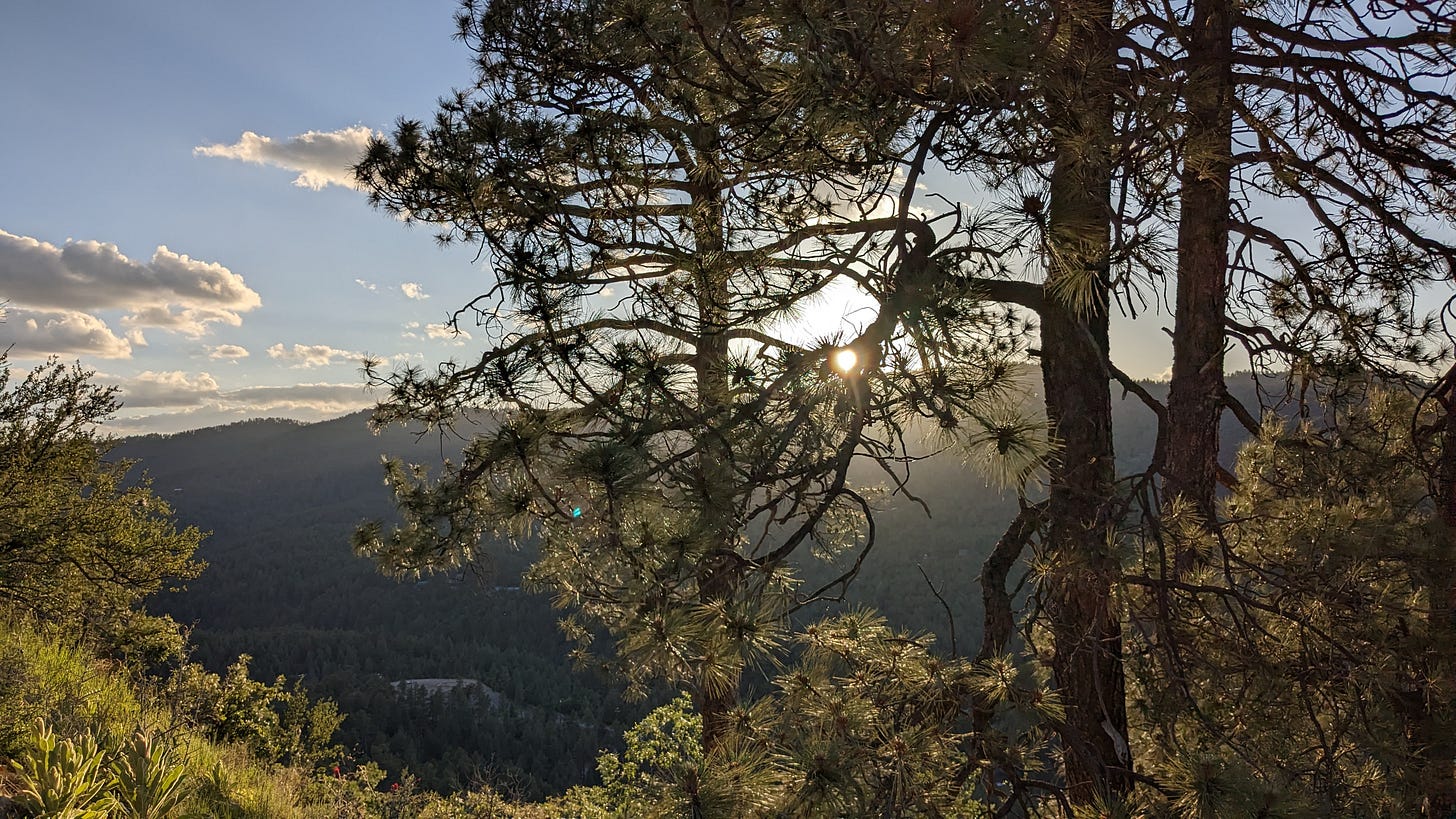
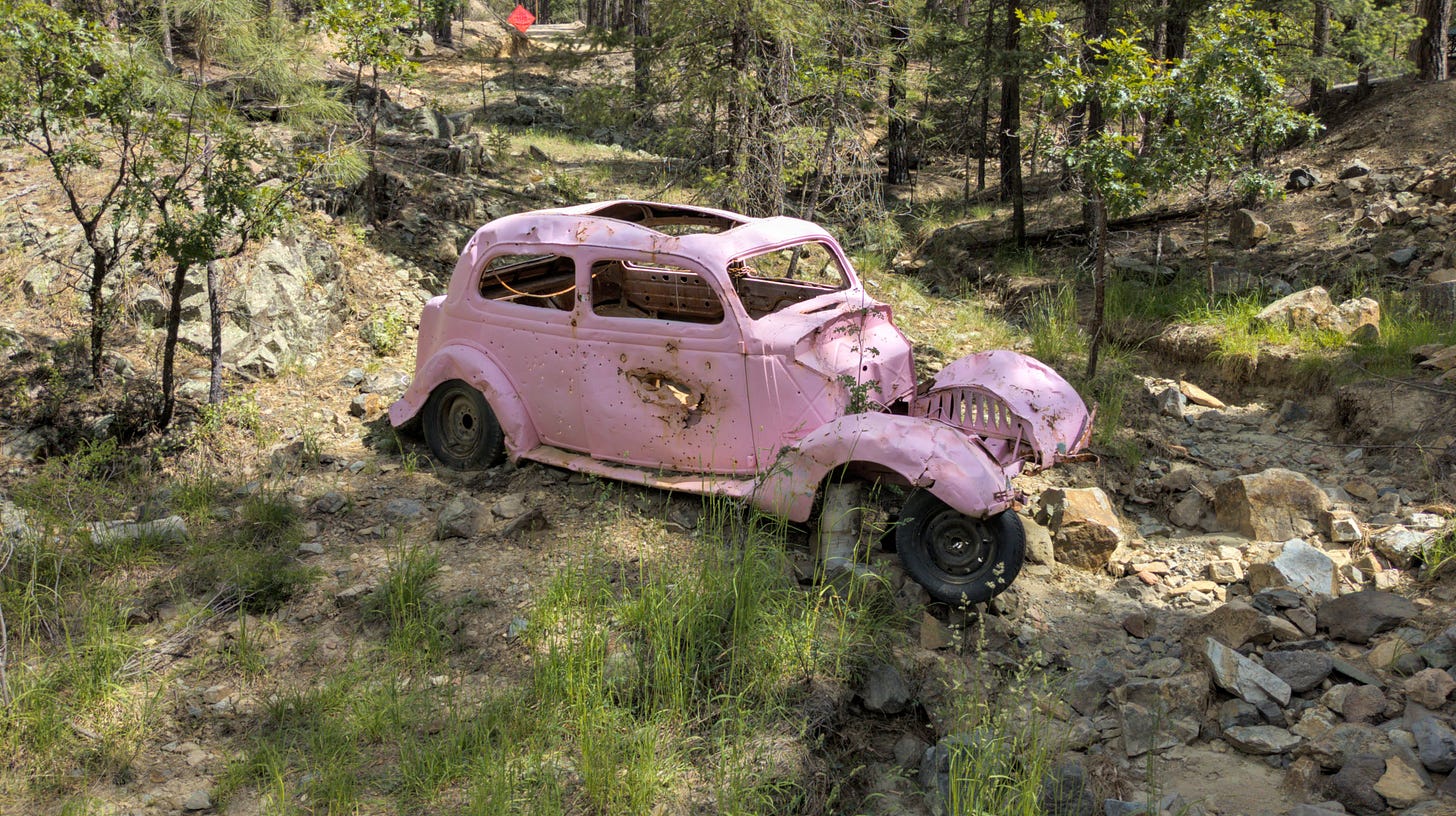
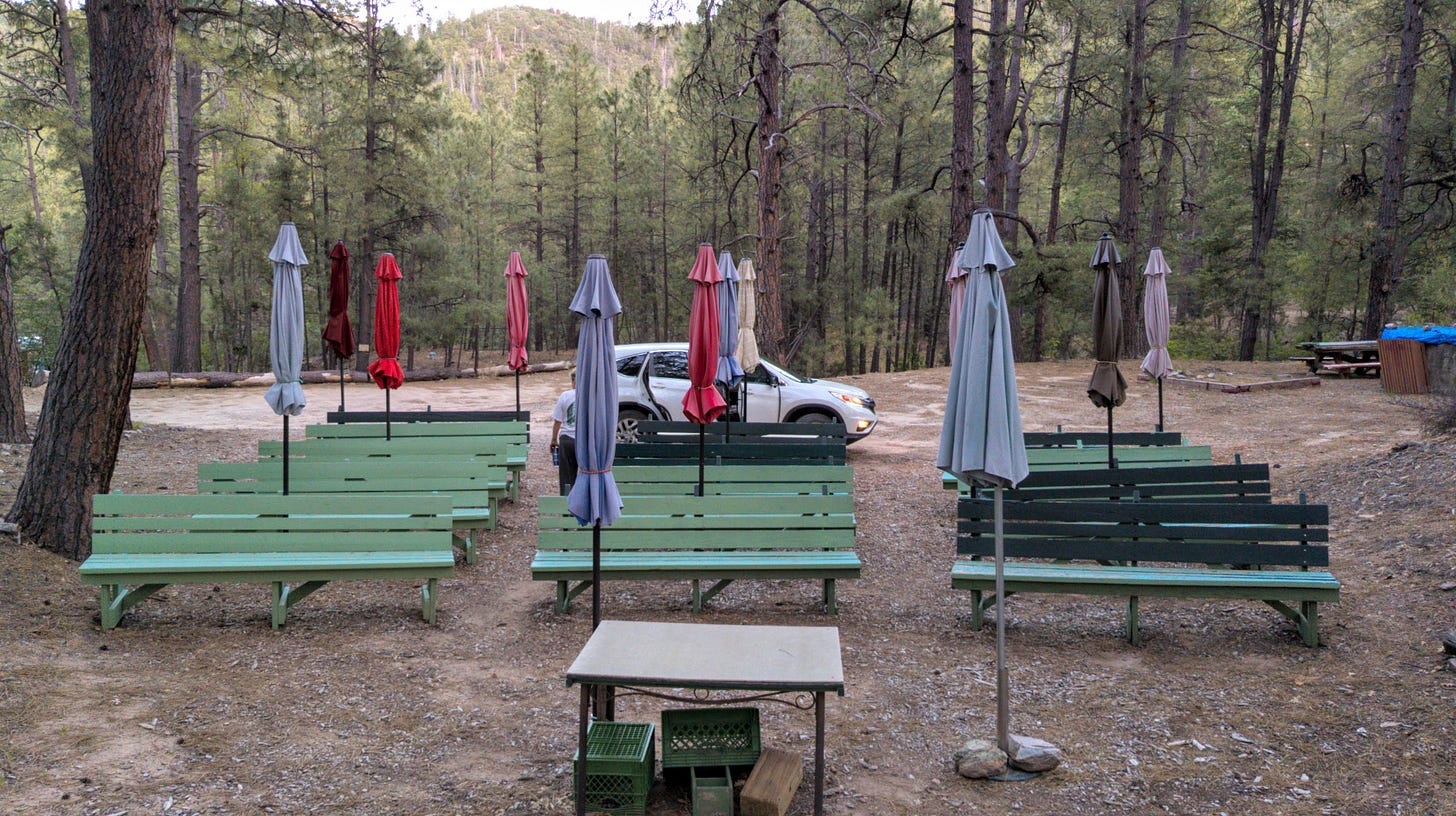
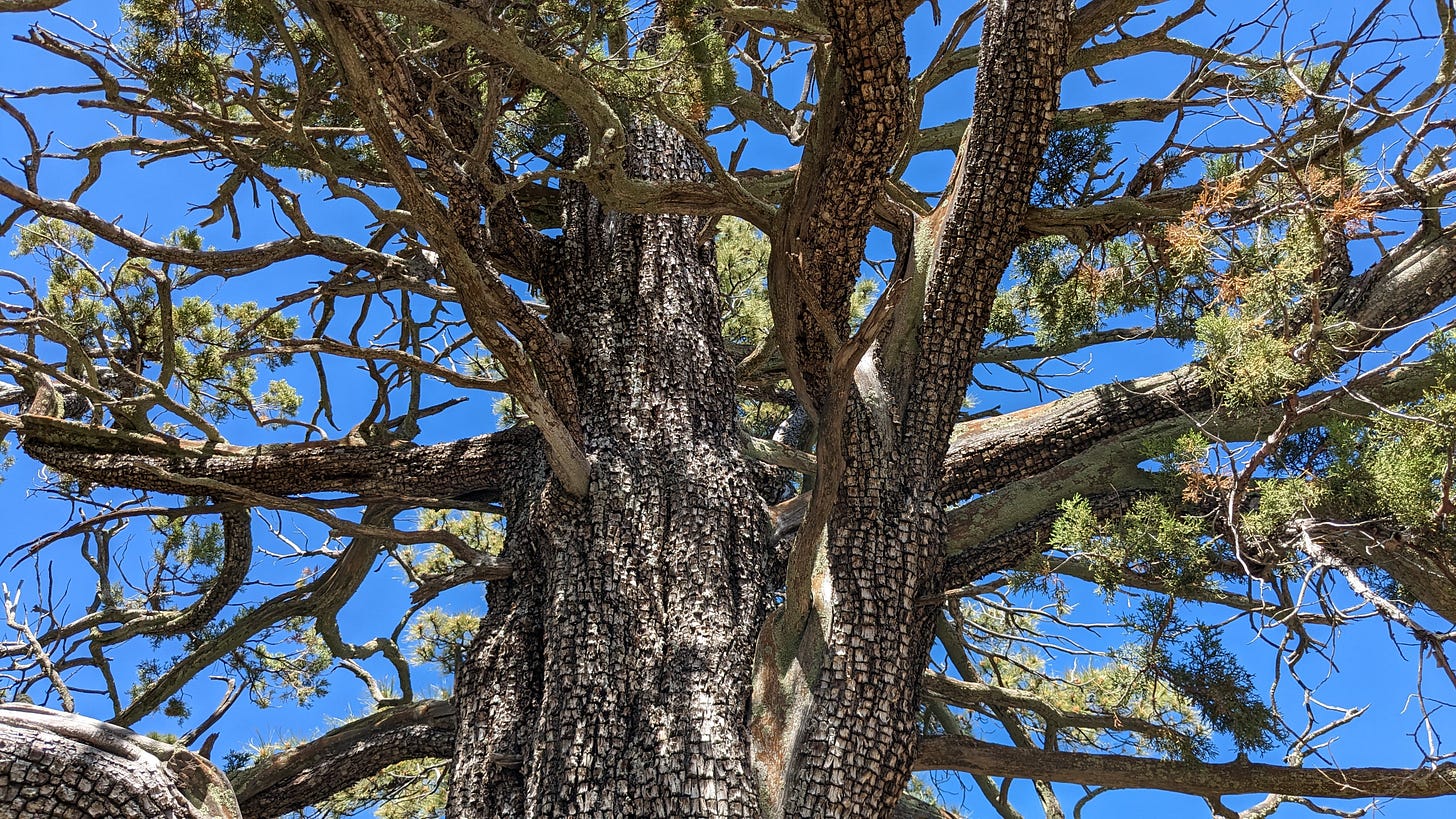
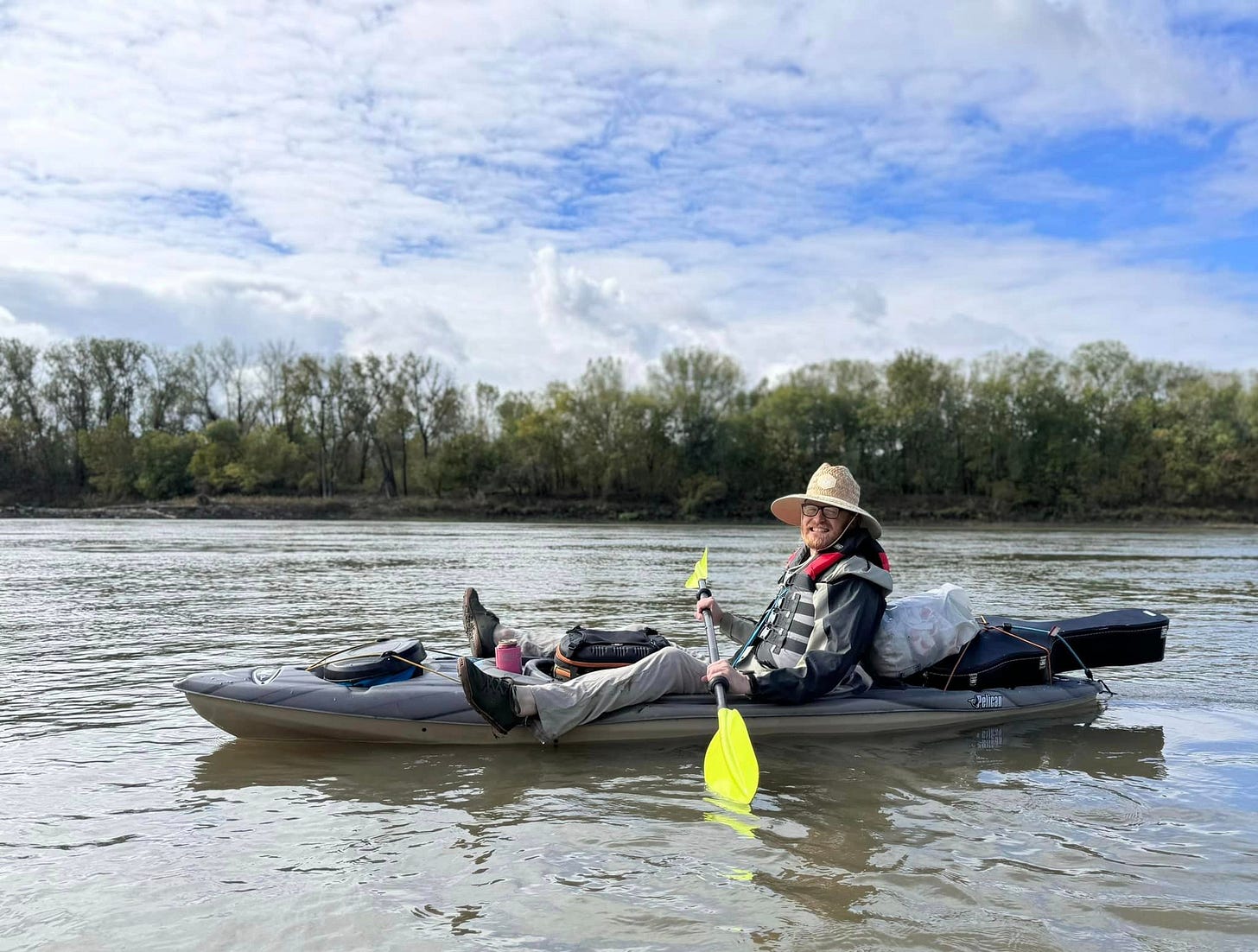
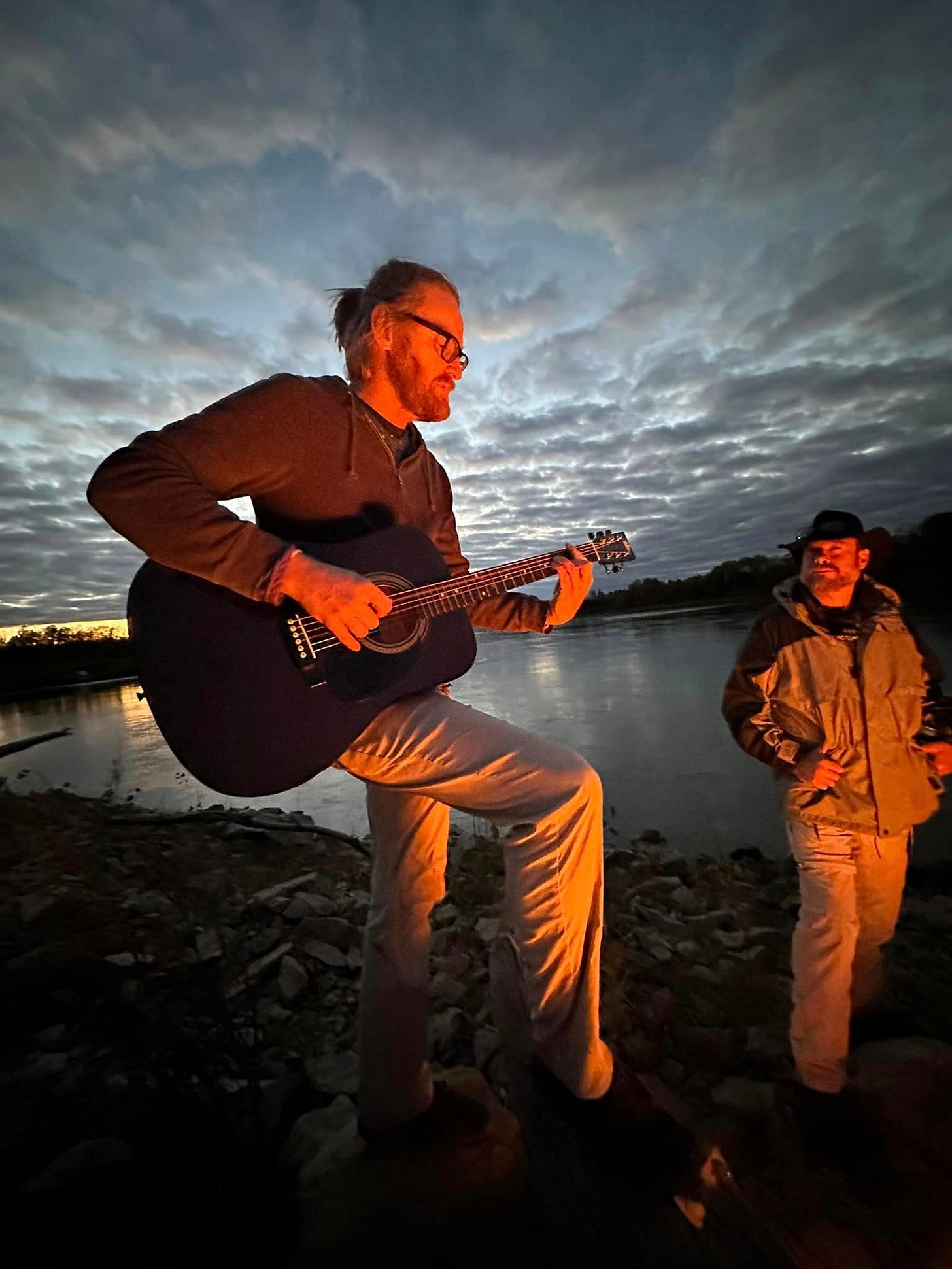
Thanks for sharing these pictures. Especially the one with Arizona Pines. Perfect for my spring adventures. :)